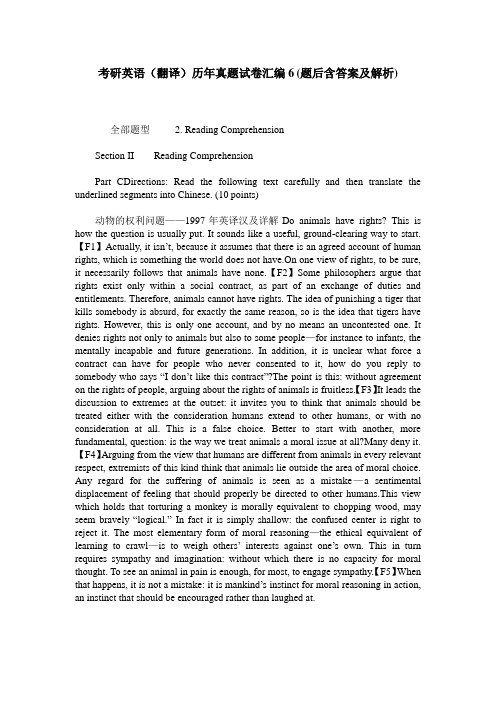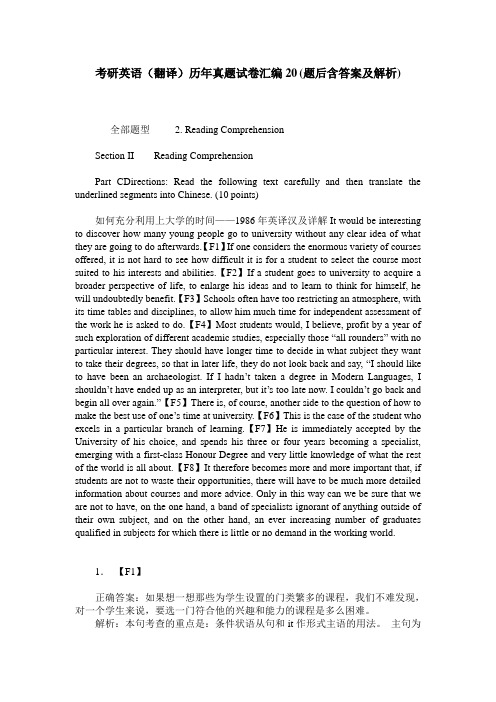考研翻译历年真题解析
考研英语(翻译)历年真题试卷汇编6(题后含答案及解析)

考研英语(翻译)历年真题试卷汇编6(题后含答案及解析)全部题型 2. Reading ComprehensionSection II Reading ComprehensionPart CDirections: Read the following text carefully and then translate the underlined segments into Chinese. (10 points)动物的权利问题——1997年英译汉及详解Do animals have rights? This is how the question is usually put. It sounds like a useful, ground-clearing way to start.【F1】Actually, it isn’t, because it assumes that there is an agreed account of human rights, which is something the world does not have.On one view of rights, to be sure, it necessarily follows that animals have none.【F2】Some philosophers argue that rights exist only within a social contract, as part of an exchange of duties and entitlements. Therefore, animals cannot have rights. The idea of punishing a tiger that kills somebody is absurd, for exactly the same reason, so is the idea that tigers have rights. However, this is only one account, and by no means an uncontested one. It denies rights not only to animals but also to some people—for instance to infants, the mentally incapable and future generations. In addition, it is unclear what force a contract can have for people who never consented to it, how do you reply to somebody who says “I don’t like this contract”?The point is this: without agreement on the rights of people, arguing about the rights of animals is fruitless.【F3】It leads the discussion to extremes at the outset: it invites you to think that animals should be treated either with the consideration humans extend to other humans, or with no consideration at all. This is a false choice. Better to start with another, more fundamental, question: is the way we treat animals a moral issue at all?Many deny it.【F4】Arguing from the view that humans are different from animals in every relevant respect, extremists of this kind think that animals lie outside the area of moral choice. Any regard for the suffering of animals is seen as a mistake—a sentimental displacement of feeling that should properly be directed to other humans.This view which holds that torturing a monkey is morally equivalent to chopping wood, may seem bravely “logical.”In fact it is simply shallow: the confused center is right to reject it. The most elementary form of moral reasoning—the ethical equivalent of learning to crawl—is to weigh others’interests against one’s own. This in turn requires sympathy and imagination: without which there is no capacity for moral thought. To see an animal in pain is enough, for most, to engage sympathy.【F5】When that happens, it is not a mistake: it is mankind’s instinct for moral reasoning in action, an instinct that should be encouraged rather than laughed at.1.【F1】正确答案:事实并非如此,因为这种问法是以人们对人的权利有共同认识为基础的,而这种共同认识并不存在。
考研英语翻译真题解析ppt课件

病原体侵入机体,消弱机体防御机能 ,破坏 机体内 环境的 相对稳 定性, 且在一 定部位 生长繁 殖,引 起不同 程度的 病理生 理过程
46.Scientists jumped to the rescue with some distinctly shaky evidence to the effect that insects would eat us up if birds failed to control them。
【参考译文】 科学家们提出一些明显站不住脚的证据
迅速来拯救(鸟类),其大意是:如果鸟类 无法控制害虫,那么这些害虫就会吃光我们 人类。
病原体侵入机体,消弱机体防御机能 ,破坏 机体内 环境的 相对稳 定性, 且在一 定部位 生长繁 殖,引 起不同 程度的 病理生 理过程
47. But we have at least drawn nearer the point of admitting that birds should continue as a matter of intrinsic right, regardless of the presence or absence of ecnomic advantage to us。
【词汇理解】
foestry林业;ecologically(从生态上 来说),advanced(先进的,发达的),be recognized as(看作是),native forest community(原始森林群落),as such(类似地,这样地)within reason(合理范围内)。
考研英语历年翻译真题及译文(共44篇)

一. 1980考研英语翻译真题及答案Section VI Chinese-English Translation将下列句子译成英语:(本大题共20分,第1题2分,其余各题均3分)Section VI: Chinese-English Translation (20 points)1.水一煮沸请立即把开关关掉。
1. Please turn off the switch (switch off) as soon as the water boils.2. 在八十年代,中国人民将以更大的步伐向前迈进。
2. The Chinese people will forge ahead (march on, march onward, march forward) with greater strides in 1980’s.3. 我们都同意李同志已作出的决定。
3. We all agree to the decision comrade Li has made (made).4. 这个结果比我们预期的要好得多。
4. The result is much (far) better than we expected.5. 在过去的三年中,在恢复我国国民经济方面做了大量的工作。
5. During the past three years a lot (of work) has been done in the recovery (restoration) of our national economy (in recovering our national economy; in restoring our national economy).6. 我们把英语作为学习西方先进科学技术的一种工具。
6. We use English as a tool in learning Western advanced science and technology.7. 没有党的领导,我国的社会主义现代化是不可能实现的。
考研英语真题翻译(2000——2009)及详解

2000年考研英语真题翻译(划线部分)详解71. Under modern conditions,this requires varying measures of centralized control and hence the help of specialized scientists such as economists and operational research experts.【考核知识点】代词指代和术语的译法【结构分析】这是一个简单句,句子主干是this requires varying measures of centralized control and...the help of specialized scientists such as...。
and连接两个并列宾语。
【翻译要点】本句的难点是hence的译法,它在句中是承上启下起连接作用的逻辑词,hence意为“从而”,翻译的时候要体现句子间的逻辑关系。
需要注意的是:require有两个宾语,第2个宾语是the help,在翻译时需要加上“获得”二字。
【词汇点滴】varying意为“不同的”;measure在这里是“程度、幅度、限度”的意思;varying measures可译成“程度不同”;operational research experts直译是“研究操作过程的科学家”,用术语翻译就是“运筹学专家”。
【参考译文】在现代条件下,这就需要不同程度的中央控制措施,从而也就需要诸如经济学和运筹学等领域的专家的协助。
72. Furthermore,it is obvious that the strength of a countrys economy is directly bound up with the efficiency of its agriculture and industry,and that this in turn rests upon the efforts of scientists and technologists of all kinds.【考核知识点】it is obvious that...的译法及短语翻译【结构分析】这是一个复合句。
2024年考研(一)翻译部分解析及参考答案

2024年考研(一)翻译部分解析及参考答案目录CONTENCT •翻译部分概述•词汇与短语翻译技巧•句子结构分析与翻译技巧•长难句理解与翻译实践•篇章理解与翻译实践•模拟试题与参考答案01翻译部分概述考研翻译部分的重要性占总分比例较高翻译部分在考研英语试卷中占比较大,对考生总成绩有重要影响。
考察综合能力翻译不仅要求考生具备扎实的英语语言能力,还需要具备一定的中文表达能力和跨文化交际能力。
区分度较高翻译部分的难度相对较高,能够较好地区分不同水平的考生。
2024年考研翻译部分的题型与分值题型2024年考研翻译部分的题型为英译中,要求考生将一篇英文短文翻译成中文。
分值翻译部分满分为15分,占总分的15%。
历年考研翻译部分的命题趋势题材广泛历年考研翻译部分的题材涉及社会、文化、科技、经济等多个领域,要求考生具备广泛的知识面。
语言难度适中翻译部分的英文原文语言难度适中,不会出现过于生僻的词汇和复杂的句式结构。
重视语言运用和表达能力翻译部分不仅要求考生准确理解英文原文的意思,还要求考生能够用流畅、准确的中文表达出来。
同时,也需要注意语言的地道性和文化背景的准确性。
02词汇与短语翻译技巧80%80%100%常见词汇的翻译方法对于一些常见且易于理解的词汇,可以直接采用直译法,将原文的意思准确地表达出来。
对于一些在目标语言中无法找到对应词汇或直译后意思不准确的情况,可以采用意译法,根据上下文和语境进行灵活翻译。
对于一些具有特定文化背景的词汇或人名地名等,可以采用音译法,将其读音用目标语言的字母表达出来。
直译法意译法音译法保持原文风格转换表达方式解释性翻译短语及习语的翻译策略对于一些在目标语言中无法找到对应表达方式或直译后意思不准确的情况,可以采用转换表达方式的策略,用目标语言中相近的表达方式来替代。
对于一些难以理解或具有特定文化背景的短语和习语,可以采用解释性翻译的策略,在翻译时对其进行解释和说明,以便读者更好地理解。
考研英语历年真题例句详解含译文翻译scientific

考研英语历年真题例句详解含译文翻译Science1.scientific [,saiən'tifik]a. 科学上的【同义词】systematic【真题例句】The scientific community was so powerful that it could afford to ignore its critics.(1998阅读3)参考译文:科学界如此强大以至于可以对批评者置之不理。
2.scientist ['saiəntist]n. 科学家【同义词】【真题例句】Scientists who know exactly where they are going and how they will get there should not be distracted.(1999阅读5)参考译文:确切知道自己的目标和怎么实现这一目标的科学家们根本没必要分心。
3.conscience ['kɔnʃəns]n. 良心,良知[真题例句]Mental health has commonly been called conscience, instinct, wisdom, common sense, or the inner voice.参考译文:心理健康普遍被称作良知、本能、智慧、常识或者内心的声音。
(2016考研英语翻译)4.conscientious[,kɔnʃi'enʃəs]a. 审慎正直的,认真的,本着良心的5.conscious ['kɔnʃəs]a. (of)意识到的,自觉的;神志清醒的【同义词】aware[真题例句]Freud formulated his revolutionary theory that dreams were the disguised shadows of our unconscious desires and fears.参考译文:一个世纪前,弗洛伊德提出了革命性的理论,即梦是我们潜意识中的欲望和恐惧经过伪装后的反映。
考研英语(翻译)历年真题试卷汇编20(题后含答案及解析)

考研英语(翻译)历年真题试卷汇编20(题后含答案及解析)全部题型 2. Reading ComprehensionSection II Reading ComprehensionPart CDirections: Read the following text carefully and then translate the underlined segments into Chinese. (10 points)如何充分利用上大学的时间——1986年英译汉及详解It would be interesting to discover how many young people go to university without any clear idea of what they are going to do afterwards.【F1】If one considers the enormous variety of courses offered, it is not hard to see how difficult it is for a student to select the course most suited to his interests and abilities.【F2】If a student goes to university to acquire a broader perspective of life, to enlarge his ideas and to learn to think for himself, he will undoubtedly benefit.【F3】Schools often have too restricting an atmosphere, with its time tables and disciplines, to allow him much time for independent assessment of the work he is asked to do.【F4】Most students would, I believe, profit by a year of such exploration of different academic studies, especially those “all rounders” with no particular interest. They should have longer time to decide in what subject they want to take their degrees, so that in later life, they do not look back and say, “I should like to have been an archaeologist. If I hadn’t taken a degree in Modern Languages, I shouldn’t have ended up as an interpreter, but it’s too late now. I couldn’t go back and begin all over again.”【F5】There is, of course, another side to the question of how to make the best use of one’s time at university.【F6】This is the case of the student who excels in a particular branch of learning.【F7】He is immediately accepted by the University of his choice, and spends his three or four years becoming a specialist, emerging with a first-class Honour Degree and very little knowledge of what the rest of the world is all about.【F8】It therefore becomes more and more important that, if students are not to waste their opportunities, there will have to be much more detailed information about courses and more advice. Only in this way can we be sure that we are not to have, on the one hand, a band of specialists ignorant of anything outside of their own subject, and on the other hand, an ever increasing number of graduates qualified in subjects for which there is little or no demand in the working world.1.【F1】正确答案:如果想一想那些为学生设置的门类繁多的课程,我们不难发现,对一个学生来说,要选一门符合他的兴趣和能力的课程是多么困难。
考研英语翻译真题及答案解析 2

考研英语翻译真题及答案解析2Section VII Chinese-English TranslationTranslate the following sentences into English. (15 points)1. 这项计划和原来的计划比起来,要完整得多。
2. 只有这样我们才能赶上世界的先进科学技术水平。
3. 你对下一步该做些什么,清楚了吗?4. 在旧中国,几乎没有什么机器制造工业,更不用说电子工业了。
5. 他在这次旅行中的所见所闻给他留下了深刻的印象。
翻译Section VII: Chinese-English Translation (15 points)1. Compared with the original one, this plan is far more complete.2. Only in this way can we catch up with the world's advanced levels in science and technology.3. Are you clear about what you should do next?4. In old China, there was hardly any machine-building industry, to say nothing of an electronic industry.5. What he saw and heard on his trip gave him a very deep impression.Section VIII English-Chinese TranslationChoose either of the following two passages. Only the underlined sentences are to be translated. (20 points)(1)Television is now playing a very important part in our life. But television, like other things, has both advantages and disadvantages. Do the former outweigh the latter?In the first place, television is not only a convenient source of entertainment, but also a comparatively cheap one. (1) For a family of four, for example, it is more convenient as well as cheaper to sit comfortably at home, with almost unlimited entertainment available, than to go out in search of amusement elsewhere. (2) They do not have to pay for expensive seats at the theatre, the cinema, or the opera, only to discover, perhaps, that the show is disappointing. (3) All they have to do is press a button, and they can see plays, films, operas, and shows of every kind, not to mention political discussions and the latest exciting football match. (4) Some people, however, maintain that this is precisely where the danger lies. The television viewer takes no initiative. He makes no choice and exercises no judgment. (5) He is completely passive and has everything presented to him without any effort on his part.(6) Television, it is often said, keeps one informed about current events, allows one to follow the latest developments in science and politics, and offers and endless series of programs which are both instructive and entertaining. The most distant countries and the strangest custom are brought right into one's sitting-room. (7) It could be argued that the radio performs this service just as well; but on television everything is much more living, much more real. Yet here again there a danger. We get so used tolooking at it, so dependent on its flickering pictures, that it begins to dominate our lives.There are many other arguments for and against television. The poor quality of its programs is often criticized. But it is undoubtedly a great comfort to many lonely elderly people. And does it corrupt or instruct our children? I think we must realize that television in itself is neither good nor bad. (8) It is the uses to which it is put that determine its value to society.(2)An office is the “Brain“ of a business. (9) In an office, figures, lis ts and information are compiled which tell the managers or heads of the business what is happening in their shops or factories. These figures guide the managers by telling them what has happened and what is happening.?Information comes into an office in all sorts of ways but the main items of information come in regularly. (10) It is part of the job of the clerks to collect and classify that information and to put it into such a form that it is easily interpreted and understood. Offices collect information then they classify it.This work of collection is common in an office from the sorting of mail every morning to the accountant's work in finding out the final figure for the year's profit. (11) Classification always requires the arrangement of the same kind of information, often into lists or columns. (12) For this work, correctness, accuracy and speed, as in all office work, are essential.There is no value, however, in collecting figures which mean nothing. Figures are guides which should help we make decisions. (13) The interpretation of information and of tables should tell us where success or failure lies, where profit can be had andwhere losses occur. (14) On this kind of information and from the known figures, a choice is made and a series of such choices may make a policy.A firm which has three factories may find, for instance, from its figures, that one factory is losing money and a choice may lie between either a change of manager, a cut in production, an increase in production or closure of the factory. Whichever one of these decisions is taken becomes the policy. (15) It is clear that a decision leading to a policy can only be as good as the information on which it is based.Consequently there is a constant search for more and more exact information. (16) Managers will want to have all the necessary facts before they can make the best decision and it is normal for them to seek for more and more information.翻译Section VIII: English-Chinese Translation (20 points)(1)1. 譬如,对于一个四口之家,舒舒服服地坐在家里收看电视,就能看到几乎是数不清的娱乐节目,这比到外面别的地方去消遣便宜得多,方便的多。
- 1、下载文档前请自行甄别文档内容的完整性,平台不提供额外的编辑、内容补充、找答案等附加服务。
- 2、"仅部分预览"的文档,不可在线预览部分如存在完整性等问题,可反馈申请退款(可完整预览的文档不适用该条件!)。
- 3、如文档侵犯您的权益,请联系客服反馈,我们会尽快为您处理(人工客服工作时间:9:00-18:30)。
1、1994年Directions:Read the following text carefully and then translate the underlined segments into Chinese. Your translation should be written clearly on ANSWER SHEET 2.According to the new school of scientists, technology is an overlooked force in expanding the horizons of scientific knowledge. (71) Science moves forward, they say, not so much through the insights of great men of genius as because of more ordinary things like improved techniques and tools. (72) "In short" , a leader of the new school contends, "the scientific revolution, as we call it, was largely the improvement and invention and use of a series of instruments that expanded the reach of science in innumerable directions. "(73)Over the years, tools and technology themselves as a source of fundamental innovation have largely been ignored by historians and philosophers of science. The modern school that hails technology algues that such masters as Galileo, Newton, Maxwell, Einstein, and inventors such as Edison attached great importance to, and derived great benefit from, craft information and technological devices of different kinds that were usable in scientific experiments.The centerpiece of the argument of a technology-yes , genius-no advocate was an analysis of Galileo' s role at the start of the scientific revolution. The wisdom of the day was derived from Ptolemy, an astronomer of the second century, whose elaborate system of the sky put Earth at the center of all heavenly motions. (74)Galileo' s greatest glory was that in 1609 he was the first person to turn the newly invented telescope on the heavens to prove that the planets revolve around the sun rather than around the Earth. But the real hero of the story, according to the new school of scientists, was the long evolution in the improvement of machinery for making eyeglasses .Federal policy is necessarily involved in the technology vs. genius dispute. (75)Whether the Government should increase the financing of pure science at the expense of technology or vice versa (反之) often depends on the issue of which is seen as the driving force.精美译文新学派的科学家认为,技术是扩大科学知识的范围中被忽视的力量。
(71)他们说,科学的发展与其说源于天才伟人的真知灼识,不如说源于改进了的技术和工具等等更为普通的东西。
(72)新学派的一位领袖人物坚持说:“简言之,我们所称谓的科学革命,主要是指一系列器具的改进、发明和使用,这些改进、发明和使用使科学发展的范围无所不及。
(73)工具和技术本身作为根本性创新的源泉多年来在很大程度上被科学史学家和科学思想家们忽视了。
为技术而欢呼的现代学派争辩说,像伽利略、牛顿、麦克斯威尔、爱因斯坦这样的科学大师和像爱迪生这样的发明家十分重视科学实验中能使用的各种不同的工艺信息和技术装置并从中受益匪浅。
鼓吹技术第一、天才第二的论据的核心是分析了科学革命初期伽利略的作用。
那时的聪明才智取自第二世纪的天文学家托勒密;了精心创立的太空体系把地球置于所有天体运动的中心。
(74)伽利略的最光辉的业绩在于他在1609年第一个把新发明的望远镜对准天空,以证实行星是围绕太阳旋转,而不是围绕地球。
但是,在新学派科学家看来,这件事中真正重要的因素是制造镜片的机械长期以来不断的改进和发展。
联邦政府的政策必然要卷入到技术与天才之争中去。
(75)政府究竟是以减少对技术的经费投入来增加对纯理论科学的经费投入,还是相反,这往往取决于把哪一方看作是驱动力量。
题目解析:(71 ) 、Science moves forward, they say, not so much through the insights of great men of genius as because of more ordinary things like improved techniques and tools.结构分析:宾语从句的主句Science // moves forward, // 主句插入结构they say, // 并列结构1 not so much 原因状语结构through // 多重定语the insights / of great men / of genius // 并列结构2 as 原因状语结构because of // more ordinary things // 举例like / improved techniques and tool.词义推敲:move forward:向前发展。
they say:间接引语作插入结构——前置。
they:指代the new school of scientists技巧:单复数对应:according to – saynot so much... as... 是as … as …(和……一样多)的否定形式,理解为:“与其……倒不如……”。
through因为技巧:not so much... as是个并列结构,也就是说so和as后面应该两个词的意思应该相同,所以多义介词through的意思应该等于because of因为,由于。
the insights / of great men / of genius:天才伟人的真知灼见。
多重后置定语——后浪推前浪,从后往前翻译。
insights:the capacity to discern the true nature of a situation; penetration 洞察力;心智的敏锐——真知灼见,远见卓识genius:天才more ordinary things like improved techniques and tool这是结构是介词like短语做定语修饰中心词more ordinary things,也是先翻译定语,再翻译中心词:像改进了的技术和工具等更为普通的东西。
like:such as参考译文:新学派科学家们说,科学之所以发展,与其说是因为天才伟人的真知灼见,不如说是因为像改进了的技术和工具等更为普通的东西。
得分重点:插入结构,并列结构,原因状语结构(72)、"In short" , a leader of the new school contends, "the scientific revolution, as we call it, waslargely the improvement and invention and use of a series of instruments that expanded the reach of science in innumerable directions. "结构分析:直接引语作宾语从句介词短语作状语“In short,” // 主句a leader / of the new school // contends, // “直接引语中的主语the scientific revolution, // 插入结构as we call it, 直接引语中的谓语// was largely // 多重定语the improvement and invention and use of / a series of / instruments // 定语从句主语that // 谓语expanded // the reach / of science // 介词短语作方式状语in innumerable direction.”词义推敲:in short 简而言之a leader of the new school contends:新学派的一位领导人物说/认为school学派。
